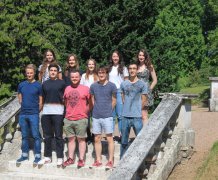
Exeter students won gold at the prestigious iGEM synthetic biology competition.
Mine waste water student project secures gold in international competition
A team of Exeter students are celebrating after winning gold at a prestigious worldwide synthetic biology competition.
The multidisciplinary team of undergraduates secured the top award at the recent international Genetically Engineered Machines (iGEM) event, held at MIT, in Boston. It is the fourth time at team from Exeter has won gold at the competition, now in its 11th year.
The students also won both the Best Environment Project and Best Applied Design awards at the event, which attracted more than 300 teams from across the world.
For the event, the Exeter team developed a toolkit to clean up mine waste water, which will have significant applications and impact in the real world.
While heavy metal ion pollutants have significant effects on local flora and fauna, and leaching has implications for human health, current treatment methods are energetically costly and, in the case of lime dosing, environmentally detrimental. They designed a bioremediation system, using modified Pili proteins to bind the heavy metals and housed the E.coli in a filtration system, to prevent the release of E.coli into the environment.
Dr Paul James, who helped coordinate the team said: “We are so happy with the team this year. Its always brilliant to see what the students can achieve over the summer and they work extremely hard to make the project the best it can be.
"With the help of the many industrial collaborators and experts within the University the team not only repeated a gold medal for the fourth year running but to come away with not one but two special prizes (Best Environmental Project and Best Applied Design) - our first special prizes in the history of Exeter iGEM - was out of this world. “
The iGEM competition challenges student teams to design new synthetic biological systems and operate them in living cells using an engineering approach. Teams are required to consider and address the safety, security, human and environmental implications of their work.
They are also required to produce a Wiki documenting their project, and a poster and presentation of their key findings. The competition allows students to develop a wide variety of skills in scientific communication, fundraising, networking, collaboration, project management and presentation skills to name a few.
The University of Exeter has a strong success rate in the competition, having entered the iGEM competition for the last five years and won one Bronze medal (2012), one Silver medal (2013) and three Gold medals (2014, 2015 and 2016). Two of the projects produced by University of Exeter undergraduates have been hugely successful, having been developed into funded projects in the lab.
to find out more about the iGem competition,visit the team's website.
Date: 6 December 2017
